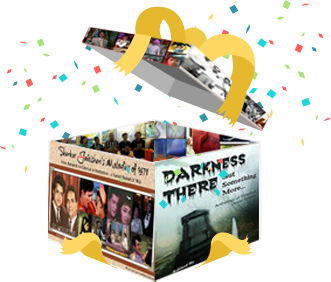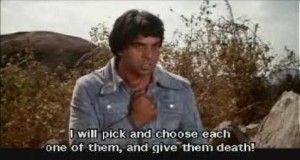
If you are a true Bollywood movie fan, you should have no trouble voting for the best eternal dialogues from our masala hits over the decades.
If you are a true Bollywood movie fan, you should have no trouble voting for the best eternal dialogues from our masala hits over the decades. The formula is pretty same as always – poor boy meets rich girl, arrogant rich dad of girl throws a fit, weepy mom of boy wails, villainous uncle plots to swindle the millions, boy falls into smuggling trap, girl goes in search of boy and ends up almost getting raped. Boy rescues girl, bashes villains, police arrives. A frantic last minute surgery. Family picture.
Now think of the dialogues that occur at some point of time in each potboiler churned out of the Bollywood mills. Here’s our shortlist:
Duniya ki koi taaqat hamein juda nahin kar sakti: (No power in the world can separate us) Love birds in any romantic movie, usually on a cliff top or in a temple
Beta, haath mooh dhokar khaana kha le (Son, wash your hands and face and eat food) Widowed poor mother of hero sewing by the kerosene lamp to her beloved son who swaggers in
Beta, chaand si dulhan le aa (Son, bring a moon-faced bride): Affectionate mother to coy son who has quite obviously found himself a girl
Dekho jee, yeh aap theek nahin kar rahe ho (listen dear, you are getting this wrong): Helpless mother to adamant father who is not willing to bend to the hero or heroine’s wishes
Maine tujhe issi liye paal-pos ke badaa kiya thha ke tu mujhe yeh din dekhaaye? (Did I bring you up to see this day) Furious dad to sulking heroine who has just conveyed that she wants to marry the hero
Mubarak ho! Tum baap banne wale ho (Congratulations, you are going to be a dad): Doctor to the hero after examining the heroine, a pulse reading is usually enough
Kutte, main tera khoon pee jaaoonga (Dog, I’ll drink your blood): Dharmendra with his flaring nostrils to every villain, who incidentally always happens to be an uncle

Ma, aaj tumhe bataana hi padega ki mera baap kaun hai: (Mom, you must reveal who my Dad is): Amitabh Bachchan’s eternal line echoed by every Naajayaz son since Laawaris
Jashn ki tayyari karo!: (Get ready for celebrations) Amrish Puri in Tridev and countless other films
Naheeeeen….!! Sprawled heroine to advancing villain
Khabardar jo usey haat bhi lagaya to!(Don’t you dare touch her): tied up hero to lecherous villain moving towards wailing heroine
Bhagwan ke liye mujhe chod do! (For God’s sake, leave me): struggling heroine to villain
Inspector sahab, giraftaar kar lo: (Inspector, arrest him): Hero to waiting policeman after bashing up villain. Typically the police waits for instructions before handcuffing the villain.
Iska to bahut khoon bahey chooka hai. Fauran operation karna padega! (He’s lost a lot of blood. We need to operate immediately) Doctor to the waiting folks, in front of a door labeled operation theater with a red bulb over it
Ab sabh kuch oopar waley ke haath mein hain! 24 ghante me hosh aa jana chahiye warna… (Everything is dependent on the Almighty): Exhausted doctor to the folks pacing in the hospital corridor
Aaj meri aankhen khul gayee: (Today my eyes have opened): Every arrogant dad in last scene
We can almost predict the dialogue before it is spoken in the formula masala movies and yet we never cease to enjoy them! That’s the magic of Hindi cinema.
Hilarious additions to Eternal Dialogues of Bollywood contributed by members of Moviemaniacs Facebook Group
Babuji ki chhithi aayi hai (we got a letter from dad) gaon ki gori to her mother who is usually found stoking the chulha
Jaiye, aap bade woh hain (You are cho chweet) coy heroine batting eyelashes at her hero/jijaji teasing her
Maa, main pass ho gaya (Mom, I passed!) hero waving a newspaper to the mother who is busy either on the sewing machine or the chulha
Main BA me first class first aaya ma (I have topped my BA class, Mom!) (when the hero is studying BA no other guy can dare come first and the hero’s sidekick will of course, flunk)
Tum mujhe chhod ke nahin ja sakte. (You can’t dump me like that) desperate heroine to helpless hero who must leave her and go for whatever’s sake
Yeh shaadi nahi ho sakti (this marriage is out of the question) the final statement from the father who can never agree to the son/daughter’s choice of spouse
Maine tumhara rishta pakka kar diya hai aur agle hafte tumhari shaadi hai (I have fixed your marriage. You’re tying the knot next week) a severe looking father to the perplexed daughter who is most definitely in love with a guy the father doesn’t have a clue about
Main tumhare bachhe ki Maa ban ne wali hoon (I’m going to have your baby) 99% of the time the hone wali maa is not yet married to the hone wala baap
Kalmoohi, kahan muhn kala karke aayi hai? (K#@&%$, where have you blackened your face) furious mom to the daughter who has sneaked home in the dead of the night only to bump into her mom who is standing on the top of the long staircase arms akimbo
Main kisiko muhn dikhane ki layak nahi rahi (Can’t show my face to anyone) this dialogue can come from the heroine as well as her mom, depending upon who is in a bigger soup – the heroine because of her love affair in shambles or the mother because her daughter has put her in a fix
Hey bhagwan! Yeh din dikhane se pehle mujhe utha kyon nahin lia, (Oh God! Why didn’t you pick me up before showing me this day) Frantic mom after discovering her daughter is all set to be an unwed mother
Agar tumne Vijay se milne ki koshish ki to mera mara munh dekhogi! (If you even so much as look towards Vijay, you will see me dead) The final ultimatum as a last resort to stop Vijay ki premika from tying the knot with Vijay
Taalluk hai milord.. bohot hi gehra taalluk hai (there is a link my lord, a very very deep connection) aggressive lawyer in flowing robes in a packed courtroom to a bored judge whose only is to thump the hammer periodically and yell “order order”)
Main dekh sakti hoon maa… ab main dekh sakti hoon (I can see now, Mom, I can see now) post-operation as the thick bandage is removed from her eyes, the heroine bats her eyelids furiously and the camera pans across her folks pouring over her; the images change from blurred to soft focus to clear. You are not supposed to notice the eye shadow and liner on the heroine’s eyes.
Main tumhare bina nahin reh sakta (I can’t live without you) the most oft-repeated moth-eaten pick up line
Main tumhe zinda nahin chodoonga (I won’t let you remain alive) Struggling hero held by five goons yells at the gangleader who brandishes his latest trophies – the heroine and the hero’s family members including ma, bhabhi, bhatija/bhateeji, etc)
Ab hamare khandaan ki izzat tumhare haathon mein hai (all our family’s honour is hanging by a thread in your hands) slogan of laachaar pita, can be used in multiple situations – (1) the heroine’s father places his pagdi in front of the hero who is a guest in a shaadi ceremony which has suddenly hit the rocks and he must save the dulhan from humiliation (2) the heroine has got herself into a nice little soup and only the hero, and the hero alone can save her
Tumhare aankhon mein aansoo? Tum ro rahi ho (Your tears are about to spill over. Are you by any chance crying?) (the most unnecessary question when the heroine visibly is not chopping onions)
and the response to this dialogue usually is
Yeh toh khushi ke aansoon hain (these are tears of joy, silly) the biggest lie – you can’t sob buckets when thrilled
Chhod do mujhe main mar jaana chahti hun (leave me, I’m planning to die) heroine at the edge of a cliff, struggling ever so gently so that the hero can easily hold her back
Bhagwan, maine aajtak tumse kuch nahin maanga (God, I don’t remember having asked much from you so far) the nastik hero who decides to ask a favor from god, making it sound as if he is doing a favor by coming to the temple
Whether you are new or veteran, you are important. Please contribute with your articles on cinema, we are looking forward for an association. Send your writings to amitava@silhouette-magazine.com
Silhouette Magazine publishes articles, reviews, critiques and interviews and other cinema-related works, artworks, photographs and other publishable material contributed by writers and critics as a friendly gesture. The opinions shared by the writers and critics are their personal opinion and does not reflect the opinion of Silhouette Magazine. Images on Silhouette Magazine are posted for the sole purpose of academic interest and to illuminate the text. The images and screen shots are the copyright of their original owners. Silhouette Magazine strives to provide attribution wherever possible. Images used in the posts have been procured from the contributors themselves, public forums, social networking sites, publicity releases, YouTube, Pixabay and Creative Commons. Please inform us if any of the images used here are copyrighted, we will pull those images down.